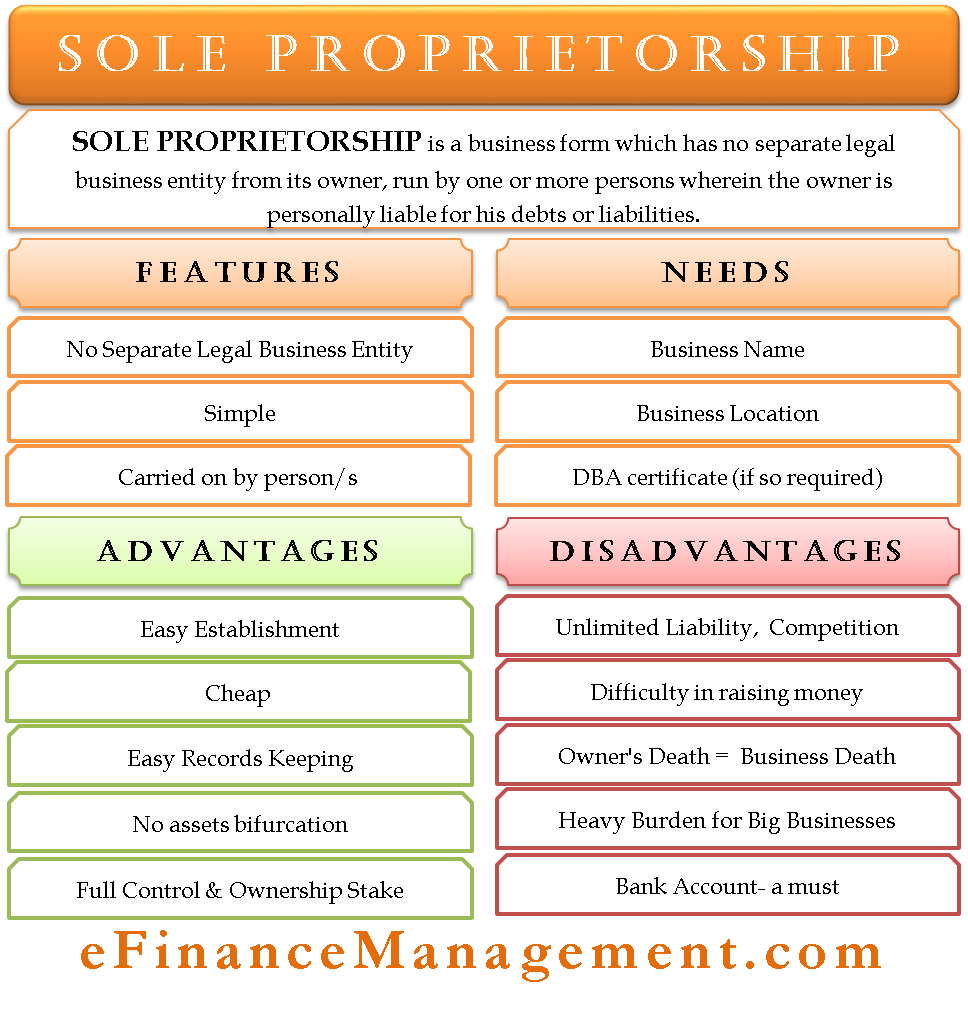We come across many business forms in today’s world, like a partnership, Joint Ventures, Limited Liability Partnership (LLP), etc. Here, we shall discuss one of the most seen and adopted forms by many, i.e., Sole Proprietorship.
Sole Proprietorship- Meaning
A sole proprietorship, also known as a sole trader or individual entrepreneurship, is a business form with no separate legal business entity from its owner. A proprietor is one who manages, looks after, and controls his business. This means he has complete control over the business and the decisions of a sole proprietorship firm.
The owner or proprietor can keep all the profits of the business and is liable to pay only the personal income tax out of all his income. There is very less government intervention and lesser compliance as there is no separate tax on the business. The owner of such a firm, however, is personally liable to pay back all debts of the business. This means that in case the business does not have enough money to pay back the debts, the owner will have to sell his personal assets and settle the debts. The proprietor has complete control over the business and the decisions of a sole proprietorship firm.
The business name is not necessarily of the person but can also be any other word. The only thing to take care of a fictitious name is that it is not presently used by someone else. For example: Look Fab Beauty Salon.
Features / Characteristics of Sole Proprietorship
No Separate Legal Business Entity
The noteworthy point of a sole proprietorship is that there is no separate legal business entity. It means that it is not separate from its owner, like in the case of a company. The actions of the owner do not differ from that of his business. Say, Mr. Ajay Awasthi- a sole proprietor has a cooler at his home and uses the same in his shop. Here, Mr. Ajay’s cooler is not bifurcated as a business or personal asset even though it is his personal asset.
Simple
A sole proprietorship is a simple form of business wherein one person can start his business with very few steps. The formalities involved here are to register his Business Name with a local authority unless there is an issue associated with the duplicate fictitious name.
Owned by one person
There may be one or more persons carrying on a sole proprietorship. The owner may hire two-three persons according to his convenience. But that does not mean that it turns out to be a partnership. The sole ownership is of the owner only. It simply means that the owner has hired those persons as employees, workers, helpers, etc. When dealing with a partnership, there are two or more persons compulsorily to begin a partnership as partners with an agreed profit-sharing proportion holding an unlimited liability. Whereas here, only the owner is responsible for his debts, profits/losses earned by him, and then he disburses it to his hired persons as per his desire.
Taxation
Profits and losses of the business are typically reported on the owner’s personal income tax return. The business itself is not taxed separately from the owner’s personal income.
Also Read: Partnership
Flexibility
Sole proprietors have the flexibility to change the direction and focus of their business quickly, as they are not bound by the decisions of partners or shareholders.
Limited Resources
Sole proprietorships often have limited access to financial resources and may find it challenging to secure loans or investments due to the perceived higher risk associated with sole ownership.
Business Continuity
The continuity of a sole proprietorship might be impacted by the owner’s health, retirement, or personal circumstances. The business might cease to exist if the owner decides to close it or passes away.
Closely Tied to Owner’s Reputation
The reputation of the business is closely tied to the reputation of the owner. Any negative actions or incidents involving the owner could affect the business’s image.
The requirements of Starting a Sole Proprietorship
There are different laws in different states. But when in general spoken about the registration obligations, there are two things required to legally start a sole proprietorship business:
- Choosing a Business Name
- Select Business Location
- Registering a DBA certificate if starting a business with a fictitious name. (if so required in some states).

Advantages of Sole Proprietorship
- Easy to establish as it doesn’t require many formalities.
- Assets can be used for personal and business purposes both
- Full control of ownership.
For more details, refer to Advantages of Sole Proprietorship.
Disadvantages of Sole Proprietorship
- Unlimited liability of the owner
- Difficult to raise funds
- No perpetual existence
For more detail, refer to the Disadvantages of Sole Proprietorship.


Wow!! this stuff is super helpful as it is so… easy to digest! Thanks so much for doing this comprehensive work and I hope you keep it up. God bless you for knowing your stuffs very well.